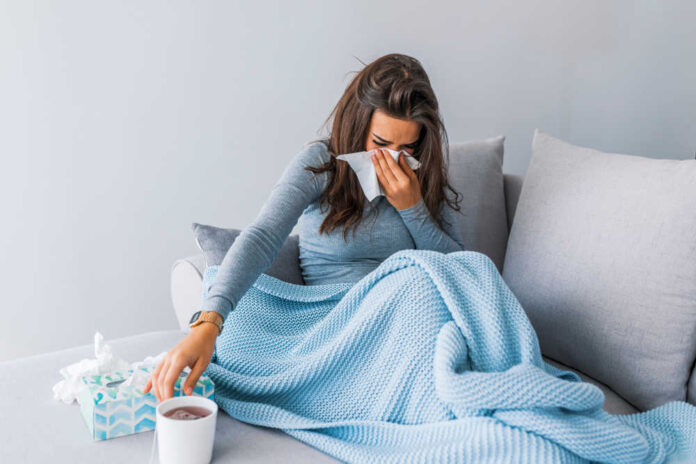
Infections spread when harmful germs multiply and travel from one person’s body to another.
This can happen in several ways, including:
- Coughing and sneezing
- Contact with saliva or mucus
- Contact with infected blood or body fluids
- Touching surfaces or objects that have been contaminated
- Sexual contact
Learning about how common infections spread can help you protect yourself, your loved ones, and everyone in your community.
The Common Cold
The common cold spreads through airborne droplets, typically from sneezing and coughing.
You are generally most contagious when your symptoms are the worst, usually around day 2 or 3. But you are also contagious for a few days before your symptoms start and can remain contagious for up to 2 weeks.
To protect yourself and others from the common cold:
- Cover your nose and mouth when you sneeze
- Wash your hands often
- Avoid close contact with people who are sick
- Stay home and away from others when you are sick
- Disinfect frequently touched surfaces
The Flu
The flu is similar to the common cold because it spreads through airborne droplets.
However, the flu is generally more severe and can sometimes be deadly, especially for young children, older adults, and people with weakened immune systems.
Symptoms typically appear two days after exposure to the virus, but you may be contagious and potentially spread it to others a day earlier. The illness typically lasts for about a week, and you may continue to be contagious for another week afterward.
Even when your symptoms are mild, and you don’t feel too sick, you can still spread the flu to others, who may end up getting a worse case of it than you.
In addition to practicing good hygiene:
- Wearing a mask when you are sick
- Stay home when you are ill
- Get the most recent flu vaccine
COVID-19
The current guidelines from the CDC state that people who test positive for the SARS-CoV-2 virus should isolate themselves from others, including people in their home.
If you are asymptomatic or have very mild symptoms, you should isolate through at least day 5 (day 0 is the day you test positive or symptoms begin). You should also wear a mask through at least day 10.
If you have a moderate or severe case of COVID-19, you should isolate yourself from others for at least ten days. Severe infections may require up to 20 days or more of isolation.
If you or someone close to you has a weakened immune system, longer isolation periods and stricter precautions should be taken.
You can help reduce the spread of COVID-19 through the following:
- Frequent testing
- Wear a high-quality mask when you are symptomatic or around symptomatic people
- Stay up-to-date on your vaccinations
- Wash your hands often and use hand sanitizer
- Avoid close contact with people who are sick
- Stay home when you are sick
Food Poisoning
Food poisoning can be caused by several different bacteria, parasites, and viruses.
While some types of food poisoning are not contagious, others can be spread through food or drinks that an infected person contaminated. This contamination typically happens when an infected person does not wash their hands properly after using the bathroom and then handles food.
Food poisoning generally lasts only 24 hours, but you may be contagious for up to 2 weeks.
To avoid spreading food poisoning:
- Washing your hands thoroughly, especially after using the restroom and before preparing food
- Do not prepare or handle food for others when you are sick
- Washing fruits and vegetables thoroughly
- Cooking and storing foods at the appropriate temperature






















